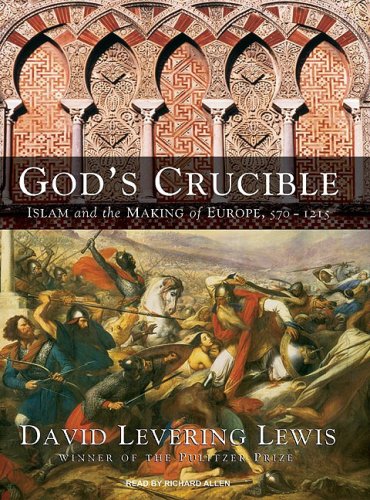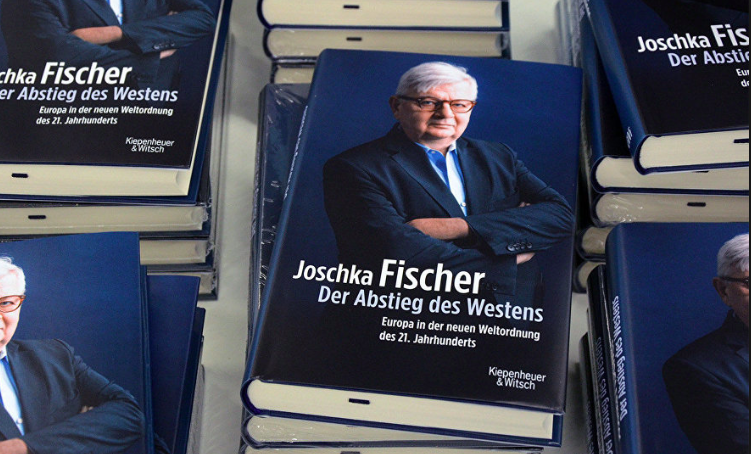
Book review: “God’s Crucible: Islam and the Making of Europe, 570-1215” by David Levering Lewis, W. W. Norton & Company (2009), 384 pages. R$ 22,40 (www.amazon.com.br)
Worried about how close the Arabs had come to defeating the Franks around Poitiers in 732, Eward Gibbon wrote in The Decline and Fall of the Roman Empire that, had the Muslims won the battle,
the Arabian fleet might have sailed without a naval combat into the mouth of the Thames. Perhaps the interpretation of the Koran would now be taught in the schools of Oxford, and her pulpits might demonstrate to a circumcised people the sanctity and truth of the revelation of Mahomet.
In his fascinating historical study about Islam and the making of Europe, David Levering Lewis takes a different view, wondering whether the famous victory of Poitiers in 732 of the Franks (led by Duke Odo and Charles Martel, Charlemagne’s grandfather) over the Arab-Berber coalition (led y Adb al-Rahman), hailed by many historians as decisive in defending the West against Islam, was really that beneficial for Europe. After all, the author argues, a Muslim triumph would have spread knowledge across the continent, including astronomy, trigonometry, Arabic numerals, Greek philosophy and medicine.
Levering Lewis writes that the Franks’ victory
must be seen as greatly contributing to the creation of an economically retarded, balkanized, fratricidal Europe that, in defining itself in opposition to Islam, made virtues out of religious persecution, cultural particularism, and hereditary aristocracy.
This rather controversial statement is part of a broader argument: Medieval Muslim culture was overwhelmingly superior to its contemporary European counterpart, and it was partly thanks to the Arab occupation of the Iberian peninsula and continued attempts to occupy what is today France that the idea of Europe emerged in the first place. A scribe in a Latin chronicle written in 754 calls the victors at Poitiers “Europenses”, the first recorded use of a Latin word for the people of Europe. Not surprisingly, it was written in al-Andalus.
God’s Crucible points out that the rulers of al-Andalus pursued a policy of civil pluralism permitting a latitude of mores, beliefs and institutions unmatched in the West since Augustan Rome. While Arabic was slowly imposed as the language of law and commerce, no pressure was exerted on the Catholic majority to convert to Islam. Perhaps most symbolic of all, at the time of the Conquest of 711, Cordoba’s Visigoth church building had been divided by treaty to serve equally Muslims and Christians, allowing both groups to worship under the same roof. Jews and Christians occupied notable positions in the administration: Cordoba’s ambassador to Constantinople, for example, was a Catholic bishop. Yet despite the liberal elements, the author admits that al-Andalus was no democracy: Non-believers had to wear badges to identify themselves, and they were only allowed to ride horses with permission. In some aspects such as women’s rights, al-Andalus was less liberal than the rest of Europe, particularly after Charlemagne began prohibiting polygamy.
Still, the book’s narrative is powerful and convincing: It was the Muslim invasion of the “Great Land” beyond the Pyrenees that contributed to establishment of a European identity. More interesting still, it was not the battle of Poitiers, but a power struggle within Islam that kept Muslims from advancing beyond the Iberian Peninsula, exactly the time Charlemagne needed to consolidate his empire and thus lay the foundation for European civilization. Indeed, the Carolingian ruler could hardly have fought the Saxons (famously resistant to Christianity) and the Lombards in Italy had expansive jihad continued.
Yet while the book mainly describes the impact of al-Andalus on Europe, God’s Crucible also excels at providing a larger picture of the time when the global center of power and thought was located in Damascus and later Baghdad, building trade routes from China and India to the Atlantic. Not only did the Muslim empire contain the known world’s largest cities, but also the architectural gems – while the “palaces” of leaders in Northern Europe were generally basic wooden structures, as the author repeatedly points out. Perhaps most importantly, al-Andalus under Adb al-Rahman was a money economy, while Charlemagne’s empire was based on barter-and-services arrangements, dramatically reducing tax revenues. Still, it remains somewhat unclear why, despite al-Andalus’ clear superiority, many Christians still preferred emigrating to live in poorer Christian kingdoms.
God’s Crucible thus contests the common notion that global history is marked by the expansion of Western ideas to a benighted non-West. Abd al-Rahman, the author asserts,
made al-Andalus the channel through which the science and philosophy of classical antiquity, preserved and augmented in the Dar al-Islam, would flow steadily into the Occidental void.
Still today, rather than producing value-free and universalist theories of inter-state relations, most international affairs commentators provide provincial analyses that celebrate and defend Western civilization as the subject of, and ideal normative referent in, world politics. Yet as God’s Crucible shows, many of the elements of today’s “Western order” are not of Western origin alone, and we tend to overestimate the role Europe and the United States have played in the creation the rules and norms and undergird our system.
In that context, God’s Crucible is a welcome contribution. And yet, Levering Lewis is certainly guilty of the opposite, as the book at times exaggerates when describing the Muslims in Iberia (particularly when led by Adb al-Rahman) as profoundly liberal and progressive, starkly contrasting backward Christian Europe. The author’s positive stance towards the Muslim presence in Europe becomes most visible towards the end of the book: one can virtually feel how much the Reconquista (the expulsion of Muslims from the Iberian Peninsula) pains the author, and he dedicates only a few pages to the centuries-long process. A more balanced approach would have strengthened his case.
Still, God’s Crucible is highly readable. Aside from this contribution to the debate about Islam’s role in the making of Europe, the book is written with remarkable fluidity, a rare achievement considering the historical complexities it covers.
Read also:
The Myth of Traditional Sovereignty?
Post-Western World’s Books of the Year
Book review: “The Magna Carta through the ages” by Ralph V. Turner
Book review: “The Boxer Rebellion and the Great Game in China” by David J. Silbey








